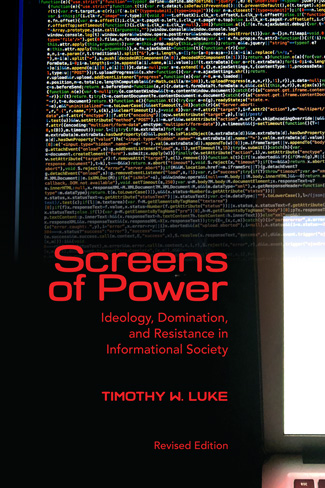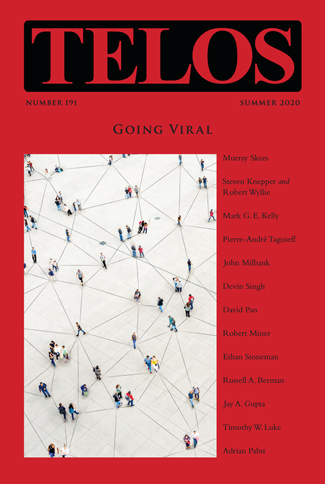By Telos Press · Tuesday, December 1, 2020 Now available! Screens of Power: Ideology, Domination, and Resistance in Informational Society, by Timothy W. Luke. Purchase your copy in our online store and save 20% by using the coupon code BOOKS20 during checkout. Also available in Kindle ebook format at Amazon.com.
Screens of Power
Ideology, Domination, and Resistance in Informational Society
 by Timothy W. Luke by Timothy W. Luke
With a Foreword by Ronald J. Deibert
This new edition of Screens of Power: Ideology, Domination, and Resistance in Informational Society, first published in 1989, reintroduces the innovative critique of informational culture, politics, and society outlined by Timothy W. Luke in Telos and other publications during the late 1970s and early 1980s. Much has changed, but far more has stayed the same, making this new edition useful for many readers, as digital images ground personal identity, informatics is geopolitics, grand history endlessly reruns as televisually formatted ritual, electronic electioneering never ends, tele-traditional cultures spin up the spirit of tele-ethnicity in new social movements, and digital divides continue crashing against cybernetic exchange.
Continue reading →
By Telos Press · Monday, November 16, 2020 Now available for pre-order: Screens of Power: Ideology, Domination, and Resistance in Informational Society, by Timothy W. Luke. Pre-order today in our online store and save 30% off the list price. Release date: December 1, 2020. Also save 30% on Luke’s Anthropocene Alerts: Critical Theory of the Contemporary as Ecocritique and on A Journal of No Illusions: Telos, Paul Piccone, and the Americanization of Critical Theory, edited by Tim Luke and Ben Agger.
Screens of Power
Ideology, Domination, and Resistance in Informational Society
 by Timothy W. Luke by Timothy W. Luke
With a Foreword by Ronald J. Deibert
Release date: December 1, 2020
This new edition of Screens of Power: Ideology, Domination, and Resistance in Informational Society, first published in 1989, reintroduces the innovative critique of informational culture, politics, and society outlined by Timothy W. Luke in Telos and other publications during the late 1970s and early 1980s. Much has changed, but far more has stayed the same, making this new edition useful for many readers, as digital images ground personal identity, informatics is geopolitics, grand history endlessly reruns as televisually formatted ritual, electronic electioneering never ends, tele-traditional cultures spin up the spirit of tele-ethnicity in new social movements, and digital divides continue crashing against cybernetic exchange.
On now countless screens of power, which are embedded in billions of smartphones, taxi seats, elevator panels, automobile dashboards, refrigerator doors, airport walls, work cubicles, skyscraper displays, exercise machines, and home video centers, a mix of disinformative mystifications exploits with vivid images of violence the unprecedented inequalities and inequities expressed in America’s bitter racial, gender, ethnic, and class conflicts. Their impact is sparking widespread popular resistance because many citizens feel oligarchy and demagoguery in both political parties are eclipsing democracy and opportunity.
Continue reading →
By David Pan · Monday, June 15, 2020 Telos 191 (Summer 2020): Going Viral is now available for purchase in our store. Individual subscriptions to Telos are also available in both print and online formats.
 While “going viral” has taken on a new meaning by recuperating an old one, it is the virtual experience that seems to be more enduring. Not only has the pandemic sped up the shifting of human activity onto virtual platforms, but the viral dynamics of social media seem set to outlast the microbial versions: it has turned out to be easier to lock down the Wuhan virus than President Trump’s Twitter feed. Yet in both cases, it is unclear whether it is the actual spread or the fear that is the greater danger. For this fear leads to the call for more authoritarian measures, whether this means censoring Twitter posts or locking down the population. But if viral spread leads to the reassertion of sovereignty, we also come to realize that the freedoms we have taken for granted are in fact the result of a curated space, in which the rules for interaction have always formed the hidden framework within which our lives have unfolded. As these framing conditions come into focus during the crisis, we have the opportunity to reimagine them in such a way as to retrieve sovereignty not as a kind of authoritarian reaction but as an understanding of how our values must inform the boundaries we set. This issue of Telos considers how the experience of going viral has come to dominate our political life as well as how our reflection on this process can free us to consider the alternatives. While “going viral” has taken on a new meaning by recuperating an old one, it is the virtual experience that seems to be more enduring. Not only has the pandemic sped up the shifting of human activity onto virtual platforms, but the viral dynamics of social media seem set to outlast the microbial versions: it has turned out to be easier to lock down the Wuhan virus than President Trump’s Twitter feed. Yet in both cases, it is unclear whether it is the actual spread or the fear that is the greater danger. For this fear leads to the call for more authoritarian measures, whether this means censoring Twitter posts or locking down the population. But if viral spread leads to the reassertion of sovereignty, we also come to realize that the freedoms we have taken for granted are in fact the result of a curated space, in which the rules for interaction have always formed the hidden framework within which our lives have unfolded. As these framing conditions come into focus during the crisis, we have the opportunity to reimagine them in such a way as to retrieve sovereignty not as a kind of authoritarian reaction but as an understanding of how our values must inform the boundaries we set. This issue of Telos considers how the experience of going viral has come to dominate our political life as well as how our reflection on this process can free us to consider the alternatives.
Continue reading →
By Mitchell Dean · Tuesday, March 27, 2018 It is difficult to know what constitutes the latest social media “scandal” for the news organizations that promote it as such. Of course, it follows the seemingly unending political concerns around social and digital media since the election of President Trump and other cornerstone events such as the Brexit vote. It stands in the long line of concerns about email hacking, Russian “meddling,” “fake news,” undignified presidential tweeting, and bots, and the indictments of workers of a Russian internet agency. There is the more general, but somewhat vacuous, thesis that the “politics of truth” has been replaced by a “politics of untruth.” Within this framing, there is the sense that “democracy” is under attack through social media; that populists, the “alt-right,” shady billionaire donors, foreign authoritarians and nativist Svengalis have found secret pathways to sow discontent within Western democracies and tip elections and plebiscites to previously unconscionable leaders and unimaginable outcomes.
Continue reading →
By Sarah Earnshaw · Tuesday, March 21, 2017 In response to a speech given by Obama in 2013 on his administration’s counterterrorism policy, popularly referred to as his “drone speech,” General William Nash commented that Obama “has begun the transition from a perpetual war to a more normalized security framework.” I address this normalization of the categorization and control of life within a global threatscape. Much of the debate at policy level, in academia, and on the flickering screens of media outlets surrounding the contemporary fixture of the counterterror arsenal, the drone, focuses upon the legal and ethical implications. Administration officials continually stress the need for “transparency” and the president’s wish that the United States hold itself to “the highest possible standards” in the conduct of a just, humanitarian war—reminding us this is indeed a war, against an organization and its affiliates.
Continue reading →
By Joshua Lawrence · Thursday, February 16, 2017 Although a frustrating incalculable for the engineers of government, religion must be acknowledged as that without which the techniques and technologies of human subjectivity would not exist. I am not here arguing for the adoption of certain religious practices or beliefs, but simply qualifying the centrality of the political by insisting on the necessity of the religious. I maintain that the asymmetry characteristic of all civilizations stems from ruptures that I describe as religious, or evental—terms that I maintain are equivalent. To probe the intricacies of asymmetrical warfare in the twenty-first century is to ask, “Whence and whither the Event?”
Continue reading →
|
|
 by Timothy W. Luke
by Timothy W. Luke


